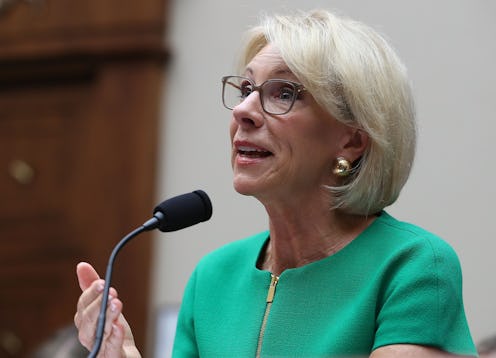News
Betsty DeVos Was Accused Of Resegregating Schools — And She Didn't Deny It

On Tuesday, Education Secretary Betsy DeVos testified before congressional lawmakers for the fifth time since assuming her office. And at one point during the testimony, one congresswoman told DeVos that her expansion of school choice programs was "resegregating" schools.
DeVos has been an advocate of school choice for decades, according to The Washington Post, and she believes that parents should have the ability to choose what schools their children attend rather than sending them to a school based on where they live. However, critics of school choice believe that it would pose a financial threat to traditional public schools, and would also lead to renewed segregation in schools.
"You are resegregating our nation's schools," Florida Rep. Frederica Wilson told DeVos during her testimony before the House Education and the Workforce Committee. "Are you aware that you are resegregating our nation's schools?" DeVos did not deny the allegation or directly respond to it at all, but she reiterated her desire to give parents a choice in where they send their kids to school.
In the testimony, DeVos also denounced the country's "culture of violence" in light of last week's mass shooting at Santa Fe High School in Texas, and suggested that schools should have a choice about whether to report undocumented students to ICE. Democratic lawmakers then grilled DeVos on a number of issues, notably school safety and civil rights protections for LGBTQ students.
School choice wasn't the only thing for which DeVos came under fire. Another Democratic lawmaker, Colorado Rep. Jared Polis, asked DeVos how she plans "to address LGBTQ discrimination and harassment in our schools." Polis cited two lawsuits where courts ruled in favor of LGBTQ students and teachers — Whitacker v. Kinosha in 2016 and Glenn v. Brumby in 2011.
In response, DeVos told Polis that she was "committed to protecting civil rights, as stated by civil rights law." However, DeVos argued that "courts have been mixed" on protections for transgender students. Polis contradicted her, arguing that courts had previously protected the rights of trans students — as did the law. But DeVos again responded that courts had been "mixed" on the issue, and according to CNN, she also remarked that Congress had not yet made its position clear.
Back in 2016, the Obama administration announced that preventing trans students from using public school bathrooms would be qualified as discrimination under Title IX, but the Trump administration rescinded this guidance last year. Moreover, the Department of Education announced earlier this year that it would no longer investigate civil rights complaints from trans students who were unable to access school bathrooms corresponding to their gender identities.
According to Politico, DeVos' appearance before the committee lasted nearly three-and-a-half hours, and she is still entangled in controversy for several arguments she made. One of these arguments was her suggestion that individual schools should be able to decide whether or not to contact ICE if they suspect a student of being undocumented. According to the American Civil Liberties Union's director of immigration policy and campaigns, "Any school that reports a child to ICE would violate the Constitution."
In addition to school choice, protections for LGBTQ students, and immigration, DeVos also addressed school safety in the wake of school shootings, but she did not mention any gun control measures or reforms, CNN reported. However, her comments about school choice perhaps had the most precedent given her track record on the issue; DeVos has previously referred to the traditional public school system as a "dead end" and a "monopoly," and has advocated for transferring federal funds away from public schools.